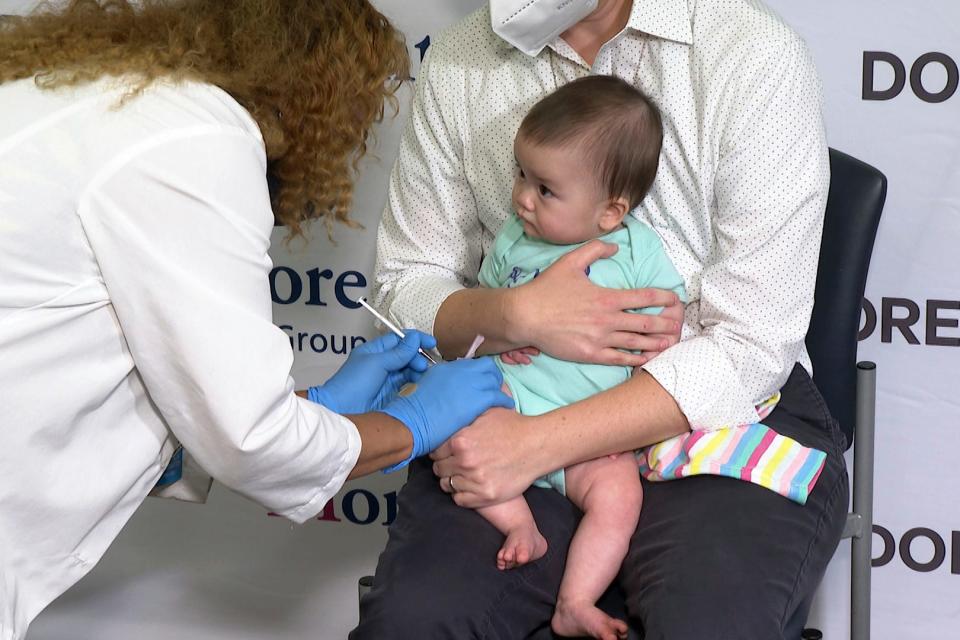Vaccine rates for younger children are already low. Nearly half of parents don't plan to vaccinate them, survey finds.
More than 4 in 10 parents said they would not vaccinate their children under age 5 against COVID-19, according to a survey by the Kaiser Family Foundation.
The findings come as vaccinations among younger children lag behind other age groups. Less than 3% of children under 5, or roughly 544,000, had received at least one dose of the vaccine as of July 20, according to a separate KFF study that analyzed data from the Centers for Disease Control and Prevention.
The Food and Drug Administration last month authorized the Moderna and Pfizer-BioNTech vaccines for children as young as 6 months.
The study, released Tuesday, marks an increase in the number of parents who said they wouldn’t vaccinate their younger children compared with surveys in January and April, before the vaccines were available for the age group.
Concerns over the vaccines’ newness, side effects and safety were the main reasons cited by parents who don’t plan to vaccinate their children.
Vaccination rates for children are low compared with those of adults – 77% of people 18 and older have been fully vaccinated, according to the CDC. Only 30% of children ages 5 to 11, who became eligible for the shot in November, have received at least one dose. But the number doubles for the 12-17 age range at 60%.
The data indicates the vaccination rate for the youngest eligible children could remain lower than the rate for children ages 5-11. A report last week from KFF said the vaccination rate for the newly eligible children had already peaked and lagged far behind the rate for older children at a similar point in the vaccine rollout.
Inside America's obesity epidemic: How America's weight (and weight loss) aren't so simple

A little over one quarter of the parents in Tuesday's report said they would “wait and see how the vaccine is working for other young children.”
Some pediatricians are hopeful the numbers will rise as parents have their kids’ doctors weigh in.
“One of the things that is most likely to move the needle on (vaccine hesitancy) and move people toward vaccination is having a conversation with a trusted health care provider who takes care of their child for other medical reasons,” said Dr. Rachel Orscheln, a pediatric infectious disease specialist at the Washington University School of Medicine in St. Louis.
Seventy percent of the survey participants said they had not talked to a practitioner about vaccinating their children. The survey’s findings noted that the rates may increase as parents take their children for annual checkups.
How will the obesity epidemic end? With kids.
“I’m also hopeful that health care providers who take care of children will use every opportunity that they see children – for sick visits, for sports physicals – to talk about vaccination, not just for COVID-19, but for all vaccine preventable diseases,” Orscheln said.
COVID-19 cases are rising in roughly half of states, and the highly contagious Ba. 5 omicron variant accounts for more than 80% of new cases, according to the latest data from the CDC.
As non-pharmaceutical interventions like social distancing and masking mandates to mitigate spread have virtually disappeared, Orscheln said vaccines are all the more crucial now, even for children, who are at less risk of severe outcomes from infection.
“They’re not at no risk. Kids have been hospitalized. Kids have died. Kids have required intensive care unit stays. Kids have developed … so-called long COVID,” Orscheln told USA TODAY. “All of these things occur at a frequency that is much lower among vaccinated children.”
Are you a frequent napper? It could be linked to high blood pressure, stroke risk, study says
This article originally appeared on USA TODAY: Report: 43% of parents won't give COVID-19 vaccine to children under 5

 money
money 